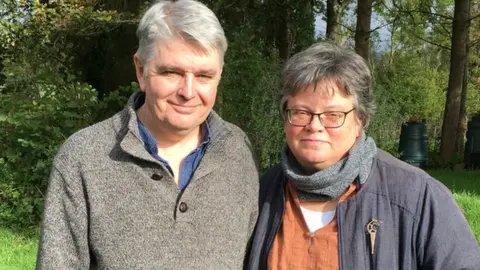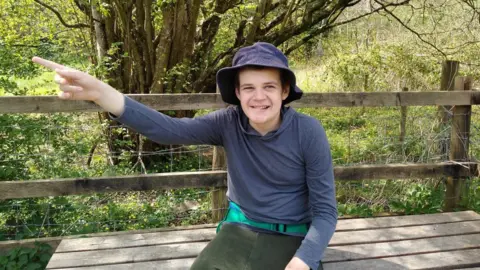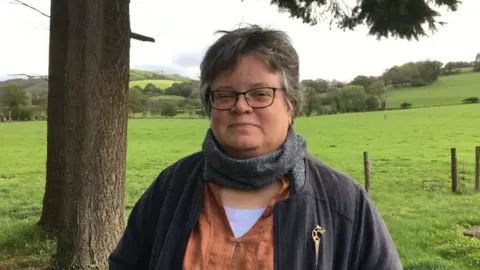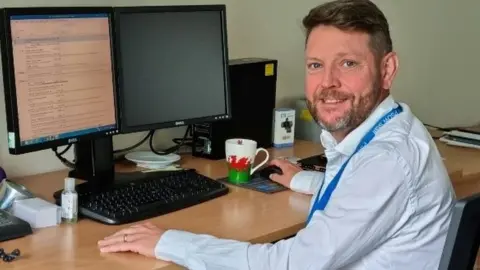Autism: Mum attacked by son after health board ends support
A mum whose severely autistic son attacked her, self-harmed and damaged their home after support was ended by the health board has spoken of her ordeal.
Karen Jankulak said it was "hard to understand" why nothing replaced Hywel Dda health board's service.
Without help for Huw, life became "awful" and "frightening", she said.
The health board apologised after being criticised in a report, citing staffing issues.
The report by the Public Services Ombudsman for Wales, Nick Bennett, concluded a "significant injustice" had been done to the family.
Ms Jankulak's son, Huw Wooding, now 19, does not speak and has learning disabilities.
Mr Bennett's report said it was likely Huw's challenging behaviour worsened and became more entrenched without specialist help.
Psychologists and psychiatrists from the health board's specialist service had often helped prevent or deal with that behaviour.
But when it ended in late 2019, it was not replaced.
'Pure despair'

At the time, Ms Jankulak's husband - Huw's father - Jonathan was working in Australia.
He later became trapped there due lockdown restrictions.
Ms Jankulak, from Lampeter, in Ceredigion, was left in "pure despair" by the end of the service.
"He would chew his hands and then all the way up his arm when the hands got too painful," she recalled.
"He would smash things, he would break things, he seemed to have a genius for seeking out really dangerous things, like bits of glass, and smashing them.
"He would attack anyone in reach but he would actually go for me as well."
She added: "It was the only way he could express how out-of-control and how unhappy he was."
'Significant injustice'
 Karen Jankulak
Karen JankulakRetired lecturer Ms Jankulak complained to Hywel Dda in February 2020, but received no response for months.
Then, in August 2020, Ms Jankulak had to call police and take Huw to Glangwili Hospital A&E in Carmarthen after his behaviour became too much.
The ombudsman upheld her complaint.
In his report, Mr Bennett described a "significant injustice" against the family.
He shared Ms Jankulak's concerns about the effect axing the service was having on other families.

"The health board identified in its risk assessment three individuals who were 18, or nearing 18, with identified ongoing needs," he said.
"It remains unclear how many younger patients were affected and whether the health board took any steps to find ways to address the outstanding needs in the cases of all of those other patients.
"I have seen no evidence of contingency planning should this service come to an end, meaning that the health board and the patients receiving the service were unprepared for the abrupt end of the service."
Huw is now in a specialist residential college.
'Absolutely horrific'
Ms Jankulak said: "There's the sense that you are without a safety net and that's quite scary.
"That makes everything so much harder when the support that should be there, and it's really the only support that could be helpful, just isn't there.
"You always fear falling off the cliff and then you fall off the cliff."
She described her experience as "absolutely horrific."
"I can't quite believe we went through that," she said.
"At the time it was indescribably awful and just so frightening."
 Nick Bennett
Nick BennettHywel Dda chief executive Steve Moore said the health board had written an apology to the family.
"This was a very challenging period for the health board's learning disability team and the psychology service in particular, due to high levels of staff absence, vacancies and unsuccessful recruitment initiatives," he said.
A health board spokeswoman added it was "ensuring full compliance" with the plan put forward by the ombudsman.
Mencap's Wayne Crocker called the report "damning" and expressed concern it contravened the Social Services and Wellbeing Act.
He said: "I'm concerned that what will happen, especially after Covid, is money will be diverted to other front-line services and specialist services like this could cease."
Prof Edwin Jones, of the British Institute of Learning Disabilities, said specialist staff recruitment was a problem in Wales.
"We don't have enough skilled behavioural experts or people with behavioural expertise," he said.
The Welsh government said it had a programme called Improving Lives that focused on helping people live healthy, happy, active lives as independently as possible.
A spokesman said: "We are working to respond to challenges caused by the pandemic while also building on the Improving Lives programme."
